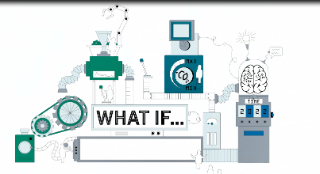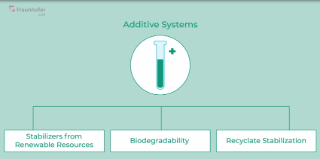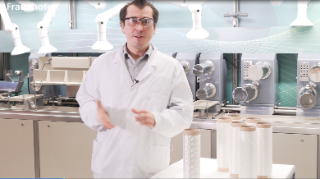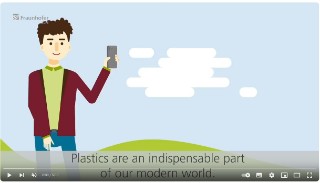Videos
Here you can see a selection of our videos. You can find the entire video collection here.
Here you can see a selection of our videos. You can find the entire video collection here.

Under the motto “Bridge the Gap to Circularity,” Fraunhofer CCPE uses an interactive miniature wonderland to demonstrate optimized material flows in a functioning circular economy. Experience what circular innovations can do for the plastics industry in everyday life: roofing membranes made from bioplastics, circular logistics, and combined recycling processes are just a few examples you can discover there.

At Fraunhofer CCPE, we are working on the development of materials made from bio-based, partially biodegradable plastics. In our current project, we have spun special ScPLA fibers. What makes these fibers so special? Prof. Dr. Johannes Ganster, Head of the Research Department “Circular Polymers” and Division Director "Biopolymers" at the Fraunhofer-Institut für Angewandte Polymerforschung IAP, explained this to us at the Circular Valley Convention 2025.

At Fraunhofer CCPE, we are convinced that truly circular products begin long before recycling—they begin with design. Sabrina Schreiner, head of Research Department Application and Demonstration and Group Manager User-centered Technology at Fraunhofer UMSICHT gives us insights into the role of CircularDesign in shaping the plastics industry of tomorrow.

At Fraunhofer CCPE, we believe that true circularity starts with smart material design. A perfect example of this is the work of Dr. Jonathan Haas, who demonstrates how mono-material sandwich structures can fundamentally simplify recycling processes – without compromising performance.

Plastics combined with the right recycling processes How can we turn plastic waste back into valuable material flows? At Fraunhofer CCPE, we are investigating how the right combination of technologies can unlock the true potential of the circular economy – tailored to the material, its condition, and its composition. In their joint work, Alexander Hofmann and Torsten Müller show how a combination of mechanical pretreatment and advanced recycling technologies leads to smarter, cleaner recycling strategies.

Additive systems for recycled material
As experts in plastic additives, Fraunhofer CCPE develops tailor-made products right up to commercial use. In collaboration with our project partner L. Brüggemann GmbH & Co. KG, our additive systems improve recycled material up to virgin material properties.

After a brief analysis of the existing product, the R-strategies (Reduce, Reuse, Recycle, Refuse, Rethink, Repair, Refurbish, Remanufacture, Repurpose and Recover) are analyzed for a scenario, for example saving CO2 or primary raw materials. The simulation results show which ecological and economic short- and long-term effects can be expected from a changed product design, and the appropriate innovation path can be derived from this.

How can products and product systems be made more circular? Which fields of action play a role here? How can this be tested? Fraunhofer CCPE researchers developed the Self-Check Tool Circular Readiness Level® (CRL) precisely for these questions. The CRL® is a web-based tool for self-validation, with which companies can assess the maturity of products or product systems in terms of the Circular Economy. It tests to what extent a product already addresses the strategies of the Circular Economy in the fields of product design, product service system, end-of-life management and closed-loop recycling and where there is still potential for improvement. The Self-check is aimed at all actors along the life cycle of products and available online as a tool for companies to validate themselves: https://ccpe.iml.fraunhofer.de/selfcheck/

Fraunhofer CCPE is researching into new additive systems with the aim of biostabilization, biodegradability and recyclate stabilization. By adding such additives, the properties of plastics can be tailor-made and improved with regard to their sustainability.

At Fraunhofer CCPE, researchers are investigating the manufacturing process of thermally stable biopolyester fibers that facilitate the recycling of fiber composites.

Old Face masks can be recycled into materials, which in turn can be used to make new masks. This is how the iCycle® process works. The thermochemical process for material separation was developed at Fraunhofer UMSICHT in Sulzbach-Rosenberg. Plastics and other organic components are thermally decomposed in an oxygen-free atmosphere. In this way, not only are contained metals or fibers gently exposed, but also high calorific value energy sources in the form of oil and gas are obtained. The colleagues explain exactly how this works in the video. More information about the face mask recycling technology iCycle®: https://www.umsicht-suro.fraunhofer.de/en/Our_Solution/iCycle.html


Plastic is currently the subject of much discussion in our society. Yet plastic is light, stable, inexpensive and versatile, and has become an important part of our everyday lives. The solution: a circular economy for plastics. Here's how it could work.